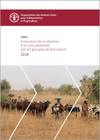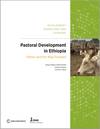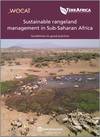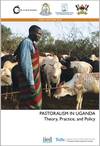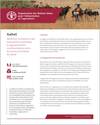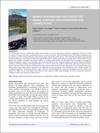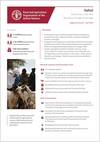La campagne agropastorale 2017/18 au Sahel a été marquée par un déficit et une mauvaise répartition spatio-temporelle des pluies. Une diminution importante de la production de biomasse, ainsi qu’un tarissement précoce des points d’eau ont été constatés dès la fin de la saison des pluies.
Les productions fourragères très faibles et quasi inexistantes dans certaines zones d’élevage en Mauritanie, au nord du Sénégal, au Sahel Burkinabé, au nord et à l’est du Niger, à l’ouest et à l’est du Sahel tchadien et par endroits au Mali, ont causé une soudure pastorale précoce ayant touché en particulier les populations rurales de ces zones ainsi que celles qui vivent dans les zones de concentration de bétail. Pour atténuer l’impact de la crise et renforcer la résilience des populations affectées, la FAO a conçu un mécanisme de réponse d’urgence qui a été mis en oeuvre par les bureaux de la FAO dans les six pays touchés – Burkina Faso, Mali, Mauritanie, Niger, Sénégal et Tchad.
Year of publication: 2019Organization: Organisation des Nations Unies pour l'alimentation et l'agriculture (FAO)
Topic: Services environnementaux, Résilience
Language: Français
Type of document: Technique
Geographical coverage: Afrique occidentale
The 4th international civil society summit Désertif’actions took place in Ouagadougou – Burkina Faso from June 19 to 22 and gathered more than 380 participants from 40 countries, representatives of 230 multi-actors organizations : local communities, NGO, scientists, local communities, international organizations, public and private actors…
- 4 themed workshops
- 3 panels
- more than 380 participants
- 40 countries represented
- 230 civil society organizations represented
This 4th edition was held in Africa for the first time, in a country where «19% of national territory lands are degraded and that has lost 2,4 millions hectares of forest, turned into savannah in 11 years». This situation reflects a Sahelian reality and more widely the fast spread of land degradation in the world.
Year of publication: 2019Organization:
Topic: Services environnementaux, Peuples autochtones, Régime foncier
Language: English, Français
Type of document: Bases de données
Geographical coverage: Global
This book is a call to act more strategically and draw lessons from 50 years of pastoral and agropastoral development investments, interventions and implementation in Ethiopia. It outlines the more resilient, prosperous, and sustainable pathways for pastoral and agropastoral livelihoods in the future. The book combines the results of an impact analysis of the development investments over half a century, a review of the existing thinking in pastoral and agropastoral development, and an assessment of the current socioeconomic conditions affecting pastoral and agropastoral communities. The aim is to paint a compelling picture of present pastoral and agropastoral development trends in Ethiopia and suggest alternative pathways for the future. Considering the challenges as well as the opportunities available in Ethiopia’s pastoral and agropastoral areas, recommendations are provided for future interventions to achieve drought-resilient, transformed, and sustainable pastoral and agropastoral livelihoods, ecosystems, and institutions that would result in peaceful, inclusive, and prosperous pastoral and agropastoral communities.
Year of publication: 2019Organization: Fonds international de développement agricole (FIDA), Banque mondiale
Topic: Services environnementaux, Organisation, Résilience, Services sociaux
Language: English
Type of document: Technique
Geographical coverage: Afrique orientale
Indeed the considerable contribution of rangelands to livelihoods and national economies is being increasingly recognized. While acknowledging the very specific and widespread challenges of the rangelands, a review of their role and potential is emerging. This change in position has been informed by better understanding and appreciation of their social, ecological and economical dynamics, and the management systems that are evolving over centuries. Nevertheless, there remains confusion in the discourse of rangelands and their importance, role and future. The overall goal of these guidelines is to contribute to improved rangeland management by illustrating a wide range of innovative rangeland management practices. This is by grouping them, clarifying their characteristics and requirements, and by illustrating their impacts on ecosystem services and human wellbeing. The ultimate aim is to demonstrate – through this unique set of convincing case studies – the value and potential of investment in rangelands. It is also hoped that these guidelines will stimulate, and assist, the identification of further cases.
Year of publication: 2019Organization: Étude mondiale des approches et des technologies de conservation,
Topic: Régime foncier
Language: English
Type of document: Technique
Geographical coverage: Afrique occidentale, Afrique centrale, Afrique orientale, Afrique australe
This book is a general reference on pastoralism theory, practice, and policy. It enables students and other readers from various professional backgrounds to understand how pastoralism functions as a system, its contributions to local, national, regional, and global economies and sustainable environmental management, and its role in promoting peace and harmony between pastoral and other communities. The book demonstrates the significant value of pastoralism today and its strategic role in contributing to Uganda’s Vision 2040.
Year of publication: 2019Organization: , Auteurs individuels, , ,
Topic: Économie, Services environnementaux, Résilience
Language: English
Type of document: Technique
Geographical coverage: Afrique orientale
La région du Sahel est confrontée à des crises agropastorales récurrentes et cycliques, essentiellement dues à des sécheresses localisées et une forte variabilité climatique, exacerbées par des problèmes structurels et de détérioration de la sécurité. Ces crises ont des conséquences dramatiques sur les moyens d’existence des populations basés sur l’agriculture et l’élevage et aggravent l’insécurité alimentaire et la malnutrition des familles.
Year of publication: 2019Organization: Union européenne (EU), Organisation des Nations Unies pour l'alimentation et l'agriculture (FAO)
Topic: Sécurité alimentaire, Résilience
Language: Français
Type of document: Technique
Geographical coverage: Afrique occidentale
For thousands of years, mobile pastoralist communities have been moving through the rangelands with their herds in search of pasture and water, making the most of scarce resources. This traditional form of livestock husbandry has persisted over the years because of its well-known interaction with nature. However, the protected areas have become a real threat to the lives and livelihoods of mobile pastoralists in many parts of the world. In this paper, the authors look at the network of Spanish drove roads, with new data on the overlap between these routes, protected areas and areas of high biodiversity. It raises some serious questions for reflection by the protected area community in relation to the practice of mobile pastoralism. From basic human rights issues to acknowledging the services pastoralists provide. Readers are invited to reflect on an issue that is not clear-cut and requires much more dialogue, as well as joint action to mitigate conflict and promote collaboration.
Year of publication: 2019Organization: Auteurs individuels
Topic: Services environnementaux
Language: English
Type of document: Technique
Geographical coverage: Europe
Following the impact of severe drought that decimated pasture, livestock and crops in 2018, the situation of millions of affected families in the Sahel is fragile. If adequate timely assistance is not provided, the food security situation will likely worsen with 9.7 million people projected to be severely food insecure during the upcoming lean season (June–August 2019). Despite overall good availability of fodder resources, access remains difficult in certain areas of Burkina Faso, Chad, Mali and the Niger where insecurity persists; in other areas – certain parts of Mauritania and Senegal – fodder resources have been depleted or are very limited.
Year of publication: 2019Organization: Organisation des Nations Unies pour l'alimentation et l'agriculture (FAO)
Topic: Sécurité alimentaire
Language: English
Type of document: Technique
Geographical coverage: Afrique occidentale


